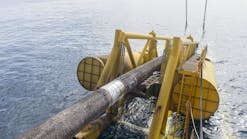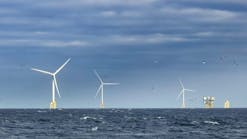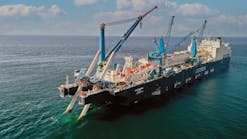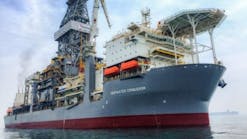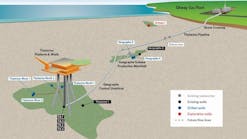- Map of France's offshore areas.
- Timor Gap wildcats: Timor Gap wildcats flowrates have been encouraging after a lackluster beginning. BHP's ZOCA Blocks 91-12 wells have led the way: 9,000 b/d at 1 Kakatua, 13,580 b/d at 2 Elang and 5,800 b/d at 1 Elang, as well as 13,400 b/d at Laminaria, just outside the Zone.
A new look at the French offshore
For some time now, French onshore oil and gas production has been declining - from 1988's 3.35 million tons of oil equivalent to today's 2.74 million tons oil equivalent. Most of the country's petroleum is imported from North and West Africa, but a new prospect has arisen lately - the possibility of production from France's own aquatory. And none too soon, since France may not be able to rely on Algerian oil much longer.
Thirty years ago, high hopes of finding oil on France's Atlantic Shelf led to the drilling of some 24 wells in the Gulf of Gascogne and 13 in the Iroise Sea, and there was also an 11-well drilling program in the Mediterranean's Gulf of Lion, but neither area proved commercial, despite several discoveries of oil and gas indications.
Now, however, these areas are attracting considerable new interest. Stimulated by the onshore discovery of the Arbousiers Field by Esso Rep, new procedures for geological assessment and recent advances in seismic technology are being employed to reappraise the areas.
A joint venture of Esso Rep and Elf Aquitaine has done more than 1,000 sq km of 3D seismic in Esso Rep's Gulf of Gascogne block, and Elf, which holds the other three allocated blocks, plans additional exploration this summer. The JV found oil, for which drilling will soon get underway.
Farther north, off the Brittany coast, expectations are high for discoveries in the Iroise Sea, due to the proximity of Irish gasfields Ballycotton and Kinsale Head and the UK's onshore Wytch Farm Field, and to the presence of vast basins of Liassic rock. As a consequence, Elf and its partners Total, BP, and Shell, which hold three blocks here, have revved up their interest and requested exploration permits, as has the Amerada/BHP-Hamilton consortium. Additionally, the French Ministry of Industry has opened the aquatory for geophysical study, issuing permits to Elf, Spectrum Energy, and CGG.
Elf has also been issued an 8,000 sq km permit to undertake new 3D seismic studies of the long ignored Gulf of Lion.
The old man and the Law of the Sea
Chalk up yet another myopic position for antediluvian thinker, US Senator Jesse Helms - he opposes US ratification of the International Law of the Sea. But this time, thanks to the Republican Party's new Senate majority, his ordinarily dismissed opinion on issues of importance will hold considerable weight, since the North Carolina legislator has been elevated to chairman of the Senate Foreign Relations Committee.
He hasn't said why he is against US agreement to abide by the Law, only that he will not consent to its ratification. His chauvinism and xenophobia undoubtedly are fundamental to this decision, since judgements under the Law are to be made by a majority vote of the members of the International Seabed Authority, it mandates technology transfer from more advanced to developing nations, and requires revenue sharing. As a consequence of Helms's recalcitrance, the effectiveness of the Law without US agreement remains in question and the benefits that would befall American industry are in limbo.
International Subsidizing US domestic operations
Despite the dynamic comeback of the US Gulf of Mexico, the domestic oil and gas industry in the United States is in dire straits and would not have its head above water if it were not for the buoying effect of international operations. So says Solomon Brothers' analyst Bill Randol, who points out that the US oil industry hasn't earned its cost of capital in six to seven years.
Alfred DeCrane, Texaco's chairman and CEO, recently warned industry leaders in his keynote address to the annual Arthur Andersen Oil & Gas Symposium in Houston that serious flaws in US energy policies enacted over the past 20 years, coupled with the country's discriminatory taxation policies and ill-informed environmental regulations, are destroying the very base that drove the American economy to world prominence.
"This past July, domestic oil production dropped to its lowest level in 10 years, while the percentage of imported crude oil rose to a new high - more than 50% - and product imports were at the highest rate in four years," he noted. "The country currently spends more than $1 billion a week to import oil, which accounts for a full half of our national trade deficit."
Around the world, he noted, nations are changing their energy policies, easing their terms, and improving their tax and environmental policies in order to attract international oil and gas companies to explore and develop their petroleum sector, thereby improving their economies and increasing their people's standard of living.
All the while, US policies, taxation, and regulations are destroying a major American asset, "reducing US status as a world power and the competitiveness of our energy, our products, and our labor, by adding to the cost of everything American workers do and make. It is time," DeCrane said, "to reconsider our national policies toward this vital industry."
Copyright 1995 Offshore. All Rights Reserved.
